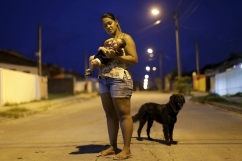The Catholic church in Latin America is under growing pressure to relax its ban on artificial contraception as fears grow over the outbreak of the Zika virus.
Apart from carrying occasional warnings from the World Health Organisation online, the Vatican has remained silent on the crisis threatening vast swathes of Latin America, where the Pope himself comes from.
The Church's official view is that artificial birth control is not permitted under any circumstances, even to help prevent HIV infection.
As the Zika virus spreads and growing numbers of babies are being born with microcephaly, or abnormally small heads and brains, the Church has remained largely silent on contraception. Abortion also remains illegal, with few exceptions, in most countries in Latin America.
Where church leaders have spoken out, it has been to reaffirm the catechism teaching that contraception is intrinsically evil.
Father Luciano Brito, spokesman for the Catholic Archdiocese of Olinda and Recife, one of the areas most severely affected, said Catholics should avoid using birth control, regardless of Zika.
Although the link has yet to be definitely proven, there is mounting evidence that the sudden surge in babies being born with microcephaly is linked to the spread of the Zika virus.
Tewedros Melesse, director general of the International Planned Parenthood Federation, said: "Despite opposition, in recent decades Latin America has made great strides in amplifying access to contraception. However much more needs to be done. In the face of the Zika virus, these gains need to be echoed throughout the region – especially for adolescents, poor women and those living in rural areas who are most likely to be exposed to the virus and least likely to have access to reproductive health services.
"Access to contraception should be available to all. Governments must ensure their medical services have the supplies for those who want it. We recommend strengthening family planning programmes and access to safe abortion services for those women who need it and where it is permitted by law."
Women in some Latin American countries have been advised not to get pregnant for up to two years.
The Rev John Paris, a bioethicist and priest at Boston College, said: "I've never seen this advice before, and when you hear it, you think, 'What are the bishops going to do?'"
Daniel Ramirez, assistant professor of history and American culture at the University of Michigan, said: "It's going to present a lot of problems for the bishops to sort out. They're going to have to really thread a fine theological needle here," according to CNN.
Nearly four in 10 of the world's 1.2 billion Catholics live in Latin America and although atheism and agnosticism is growing there as in the West, the Church remains a huge influence throughout society.

















